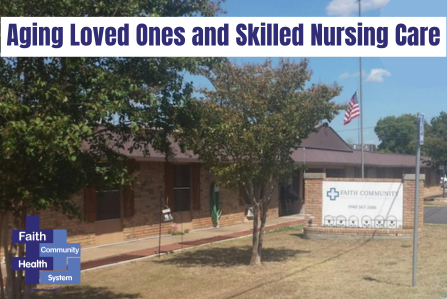There is no easy way to start a conversation about skilled nursing care with aging loved ones. This is especially true if they have shown considerable resistance in the past or they are in a state of mind where they are not willing to accept they need some assistance with activities of daily living – eating, bathing, dressing and taking medication.
However, at the same time, if you are thinking about this topic, it’s likely you are feeling the burdens of being a caregiver. It’s not unusual to feel guilty about this. After all, your parents have been there for you and you want the very best for them.
How do you know when it’s time to turn to skilled nursing care from Faith Community Nursing & Rehabilitation for assistance? Review the following list of “telltale signs” that it’s time to consider transitioning your loved one into a facility where they can get around-the-clock care from medical professionals.
3 Signs It’s Time to Have “The Talk”
1. Declining Health: Many people live with chronic health conditions – diabetes, heart disease and even dementia (including Alzheimer’s disease) – for a long time without around-the-clock care. However, when any health condition is deteriorating rapidly, it’s time to consider a skilled nursing facility that is equipped to care for your loved one on the spot.
If you have been trying to care for your loved one at home, we applaud you. Caregiving is difficult, with or without a chronic health condition. However, if your loved one’s health is on the decline, please consider getting them trained care who are able to monitor their condition daily and take action if it’s needed.
2. Activities of Daily Living: Things like showering, dressing, eating and managing medicine are all categorized as “activities of daily living.” We do these things without thinking about it. Obviously, eating well means having food in the refrigerator. Taking medications as prescribed means seeing a doctor and picking up prescriptions at the pharmacy. Remembering to take showers regularly and get dressed daily are ingrained behaviors.
However, if your loved one is having trouble managing daily tasks – including cooking, taking care of pets, paying bills and even throwing out garbage – it may be time to learn more about skilled nursing. This is especially true if their attention to these details have changed recently.
3. Social Isolation: Older adults who live alone are at risk for isolating themselves. This is especially true if they are visually or hearing impaired. Additionally, if your loved one has mobility issues, they may find it easier to stay alone rather than risk a fall.
Signs of isolation include chronic diseases, signs of dementia and general cognitive decline, according to AARP. Further, if a person is isolating, they may not be seeing their doctor, taking their medicine, managing personal hygiene and eating right. All of these things can lead to other chronic health conditions including heart disease and high blood pressure.
Jacey Brittain, administrator of Faith Community Nursing & Rehabilitation, 211 East Jasper St, Jacksboro, understands how difficult it can be to discuss the idea of moving into a skilled nursing facility with aging loved ones. However, after many years in this field of work, she is ready and able to talk to you and your family members about the high quality care offered at the Faith facility.
Call (940) 567-2686 to schedule an introductory meeting, tour and enjoy lunch at Faith Community Nursing & Rehabilitation.

